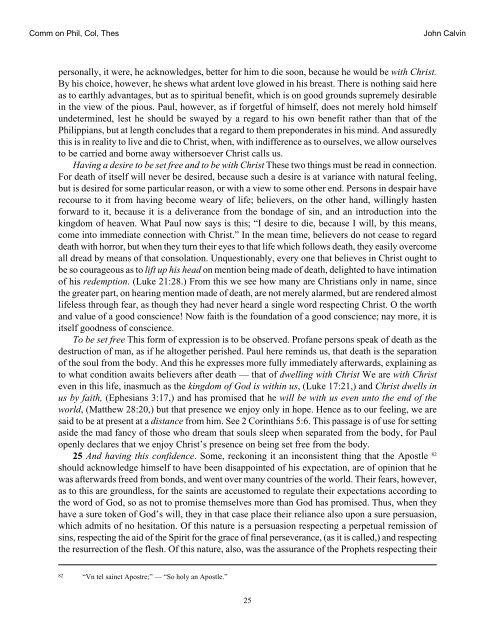Commentary on Philippians, Colossians, and Thessalonians
Commentary on Philippians, Colossians, and Thessalonians
Commentary on Philippians, Colossians, and Thessalonians
Create successful ePaper yourself
Turn your PDF publications into a flip-book with our unique Google optimized e-Paper software.
Comm <strong>on</strong> Phil, Col, Thes<br />
pers<strong>on</strong>ally, it were, he acknowledges, better for him to die so<strong>on</strong>, because he would be with Christ.<br />
By his choice, however, he shews what ardent love glowed in his breast. There is nothing said here<br />
as to earthly advantages, but as to spiritual benefit, which is <strong>on</strong> good grounds supremely desirable<br />
in the view of the pious. Paul, however, as if forgetful of himself, does not merely hold himself<br />
undetermined, lest he should be swayed by a regard to his own benefit rather than that of the<br />
<strong>Philippians</strong>, but at length c<strong>on</strong>cludes that a regard to them prep<strong>on</strong>derates in his mind. And assuredly<br />
this is in reality to live <strong>and</strong> die to Christ, when, with indifference as to ourselves, we allow ourselves<br />
to be carried <strong>and</strong> borne away withersoever Christ calls us.<br />
Having a desire to be set free <strong>and</strong> to be with Christ These two things must be read in c<strong>on</strong>necti<strong>on</strong>.<br />
For death of itself will never be desired, because such a desire is at variance with natural feeling,<br />
but is desired for some particular reas<strong>on</strong>, or with a view to some other end. Pers<strong>on</strong>s in despair have<br />
recourse to it from having become weary of life; believers, <strong>on</strong> the other h<strong>and</strong>, willingly hasten<br />
forward to it, because it is a deliverance from the b<strong>on</strong>dage of sin, <strong>and</strong> an introducti<strong>on</strong> into the<br />
kingdom of heaven. What Paul now says is this; “I desire to die, because I will, by this means,<br />
come into immediate c<strong>on</strong>necti<strong>on</strong> with Christ.” In the mean time, believers do not cease to regard<br />
death with horror, but when they turn their eyes to that life which follows death, they easily overcome<br />
all dread by means of that c<strong>on</strong>solati<strong>on</strong>. Unquesti<strong>on</strong>ably, every <strong>on</strong>e that believes in Christ ought to<br />
be so courageous as to lift up his head <strong>on</strong> menti<strong>on</strong> being made of death, delighted to have intimati<strong>on</strong><br />
of his redempti<strong>on</strong>. (Luke 21:28.) From this we see how many are Christians <strong>on</strong>ly in name, since<br />
the greater part, <strong>on</strong> hearing menti<strong>on</strong> made of death, are not merely alarmed, but are rendered almost<br />
lifeless through fear, as though they had never heard a single word respecting Christ. O the worth<br />
<strong>and</strong> value of a good c<strong>on</strong>science! Now faith is the foundati<strong>on</strong> of a good c<strong>on</strong>science; nay more, it is<br />
itself goodness of c<strong>on</strong>science.<br />
To be set free This form of expressi<strong>on</strong> is to be observed. Profane pers<strong>on</strong>s speak of death as the<br />
destructi<strong>on</strong> of man, as if he altogether perished. Paul here reminds us, that death is the separati<strong>on</strong><br />
of the soul from the body. And this he expresses more fully immediately afterwards, explaining as<br />
to what c<strong>on</strong>diti<strong>on</strong> awaits believers after death — that of dwelling with Christ We are with Christ<br />
even in this life, inasmuch as the kingdom of God is within us, (Luke 17:21,) <strong>and</strong> Christ dwells in<br />
us by faith, (Ephesians 3:17,) <strong>and</strong> has promised that he will be with us even unto the end of the<br />
world, (Matthew 28:20,) but that presence we enjoy <strong>on</strong>ly in hope. Hence as to our feeling, we are<br />
said to be at present at a distance from him. See 2 Corinthians 5:6. This passage is of use for setting<br />
aside the mad fancy of those who dream that souls sleep when separated from the body, for Paul<br />
openly declares that we enjoy Christ’s presence <strong>on</strong> being set free from the body.<br />
25 And having this c<strong>on</strong>fidence. Some, reck<strong>on</strong>ing it an inc<strong>on</strong>sistent thing that the Apostle 82<br />
should acknowledge himself to have been disappointed of his expectati<strong>on</strong>, are of opini<strong>on</strong> that he<br />
was afterwards freed from b<strong>on</strong>ds, <strong>and</strong> went over many countries of the world. Their fears, however,<br />
as to this are groundless, for the saints are accustomed to regulate their expectati<strong>on</strong>s according to<br />
the word of God, so as not to promise themselves more than God has promised. Thus, when they<br />
have a sure token of God’s will, they in that case place their reliance also up<strong>on</strong> a sure persuasi<strong>on</strong>,<br />
which admits of no hesitati<strong>on</strong>. Of this nature is a persuasi<strong>on</strong> respecting a perpetual remissi<strong>on</strong> of<br />
sins, respecting the aid of the Spirit for the grace of final perseverance, (as it is called,) <strong>and</strong> respecting<br />
the resurrecti<strong>on</strong> of the flesh. Of this nature, also, was the assurance of the Prophets respecting their<br />
82 “Vn tel sainct Apostre;” — “So holy an Apostle.”<br />
25<br />
John Calvin















